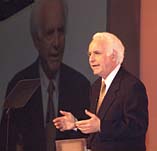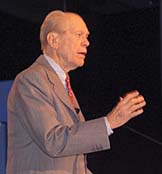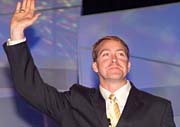
And, what is learned is not necessarily all business-related. At this year’s gathering March 2-6, for instance, attendees got the opportunity to hear from former President Gerald Ford, former Baltimore Orioles shortstop and third baseman Cal Ripken Jr., and U.S. Olympic winner in the men’s skeleton, Jimmy Shea.
With a war looming on the horizon, politics was not out of the picture, either. At the opening breakfast, former New York City Police Commissioner Bernard Kerik gave a chilling account of that fateful day, Sept. 11, 2001. While Kerik advocated that Americans should not forget what happened, another speaker, Dr. John Stoessinger — who is currently Distinguished Professor of International Affairs at the University of San Diego and a survivor of the Holocaust — hinted that war did not have to occur, turning to his recollections of the Cuban Missile Crisis of 1962. Senator Fred Thompson also shared his thoughts on politics at the closing session.

With so much to see and do — including a Mardi Gras extravaganza, which gave attendees the chance to delve into a variety of New Orleans-based desserts while enjoying some music and dancing — no wonder members (along with spouses and family) flock to this annual affair, year in and year out. More than 1,640 made sure to be a part of the 2003 experience, held at the Desert Springs resort — which was a draw in itself, along with warm weather, inviting pools, and surrounding golf courses.

Big-Name Speakers
The convention’s theme, “Building Relationships,” provided the framework for the week’s activities. After enjoying the opening day’s sports events, attendees listened to 2002 MCAA president Bob FitzGerald recap his experience and discuss the ways in which MCAA helps members thrive in a competitive industry. Afterward, former President Ford stepped to the podium to talk about the pressing need for bipartisanship in politics.“I’m fed up with those that go around bashing our country,” said Ford, who received a warm reception, including a prolonged standing ovation at the beginning and another at the conclusion of his presentation.
In defense of Bush, Ford said, “He has to deal with the global threat of terrorism. There is no leader he can sit down and negotiate with. I applaud what he has done to meet the challenge.”
The former president also cautioned the audience about the role of government in Washington, D.C. “A government big enough to give you everything you want is big enough to take everything you have,” he said.
Meanwhile, Kerik was just as passionate about the need for a positive defense of our nation’s safety. “We waited way too long to start the war on terrorism,” said the former NYC police commissioner. “The mindset has not changed. They hate us for our economic freedoms. They’d like nothing more than to destroy us. … Until we send a message that they will hear, it [terrorism] will continue.”
To no one’s surprise, Ripken and Shea talked about the importance of teamwork. Shea, the first American to win the gold medal in men’s skeleton, provided his audience several points to live by, including having passion and belief in what you do.
“Have a positive attitude,” he stressed. “Be excited in what you do. Above all, make it happen. I always said, ‘I’m going to make it happen.’ I couldn’t live with myself if I did not give it my all.”
Businessman Rich Teerlink touched upon the same theme, telling the story of Harley-Davidson’s return to preeminence.
“What made Harley different from the others? I really do not know the exact formula of what made Harley different, other than we seemed to have a unique bond with the customer, the riders,” said Teerlink, who came to his session riding in on a Harley motorcycle. “And, they [Harley’s customers] got themselves involved as being a part of a community.”
Teerlink concluded that the only sustainable competitive advantage in this day and age is people.
“Leadership is a process in which people work together to achieve mutual goals because they want to, not because I have to.”

From Wireless Technology To Grassroots Leadership
Other major session and workshop presenters also delivered important information on a variety of subjects, including wireless technology, grassroots leadership, project management, mold and its impact on contractors, and the growing importance of political decisions affecting water availability.In his session, “Collaborative and Wireless Technology,” Paul Doherty, AIA — a registered architect and one of the global industry’s most sought-after consultants and integrators of technology and business — sought to provide contractors with an understanding of the principles needed to create their own mobile/wireless strategy, how to find the resources to implement that strategy, and how to provide a factual value analysis to support a mobile/wireless initiative.
“Many predicted that the Internet would fundamentally change the AEC [architect/engineer/contractor] industry,” said Doherty, who is also the managing director of the digital group, a global technology consultancy. “As we have witnessed over the past year or so, the Internet alone will not alter the built environment. But, when integrated into other processes, technologies and protocols, the Internet’s ability to connect us to people, places, and things is beginning to seed the winds of change in ways we cannot even imagine today.”
Doherty said the whole point of the coming wireless technologies is to make them so easy and cheap that using them becomes as common as using a mobile phone itself. However, for this to become a reality, Doherty said the world’s mobile networks must be replaced, the world’s “individual” networks must be developed, and wireless connectivity must interoperate.
“With so many hurdles to overcome, wireless and mobile AEC solutions seem to be far off on the horizon, when in fact, they will explode on the marketplace within a short period of time,” he said. “Your ability to understand and manage this explosion will result in increased gains in efficiency and a differentiation in the marketplace with your competition.

Meanwhile, retired Navy captain Mike Abrashoff encouraged his audience to return to, as he coined it, “grassroots leadership,” as detailed in his best-selling book, It’s Your Ship: Management Techniques from the Best Damn Ship in the Navy.
“What motivates people in my business is the same as in your business,” said Abrashoff. “We can order people to perform, but what we can’t order is great performance.”
When he was selected to become commander of the USS Benfold at the age of 36, Abrashoff said he faced staggering challenges: exceptionally low morale with unacceptably high turnover. Although many had given up on the ship’s viability, Abrashoff said he became more resolved to turn the situation around. At his induction ceremony, as his predecessor left to cheers of relief from the crew, Abrashoff said he knew with certainty that the days of command and control leadership were dead.
“It was an extreme situation, but one that mirrors the problems facing many organizations today,” he said.
By learning to see the ship from the eyes of his crew, Abrashoff said his ship turned around completely.
“Telling people what to do is not the correct leadership style,” he said. “I knew I had to change people’s attitudes. Our success depended upon teamwork.”
Leadership should spring from “a general desire to help people,” he said. “The key is being genuine and authentic.”
“A lot of people do whatever it takes to secure the next promotion,” he said. “All I ever wanted to do in the Navy was to command a ship. I did not care if I ever got promoted again. And that attitude enabled me to do the right thing for my people instead of doing the right things for my career. Along the way, it was my people that created the results that ensured my next promotion.”
United Association general president Marty Maddaloni and 2003 MCAA president Tom Williams conducted a question-and-answer session for the mechanical construction and service industry to conclude the week’s events.
Sidebar: Cal State Polytechnic Wins Student Competition
PALM DESERT, Calif. — Student chapters stole the spotlight at the 7th annual Awards of Excellence ceremony, held at the 2003 MCAA convention. The association honored members and local affiliates for exceptional performance, welcomed eight new student chapters, recognized the winner of the 2002 Student Chapter Competition, and paid tribute to Bob Waddy for his distinguished service to the association.Those receiving honors were:
Other Best Practices awards were presented to the Rock River MCA for its Buildings for Kids program, MCA of New Jersey for its mentoring program, and MCA of South Florida for its Continuing Education Collaborative program.
Publication date: 03/31/2003



